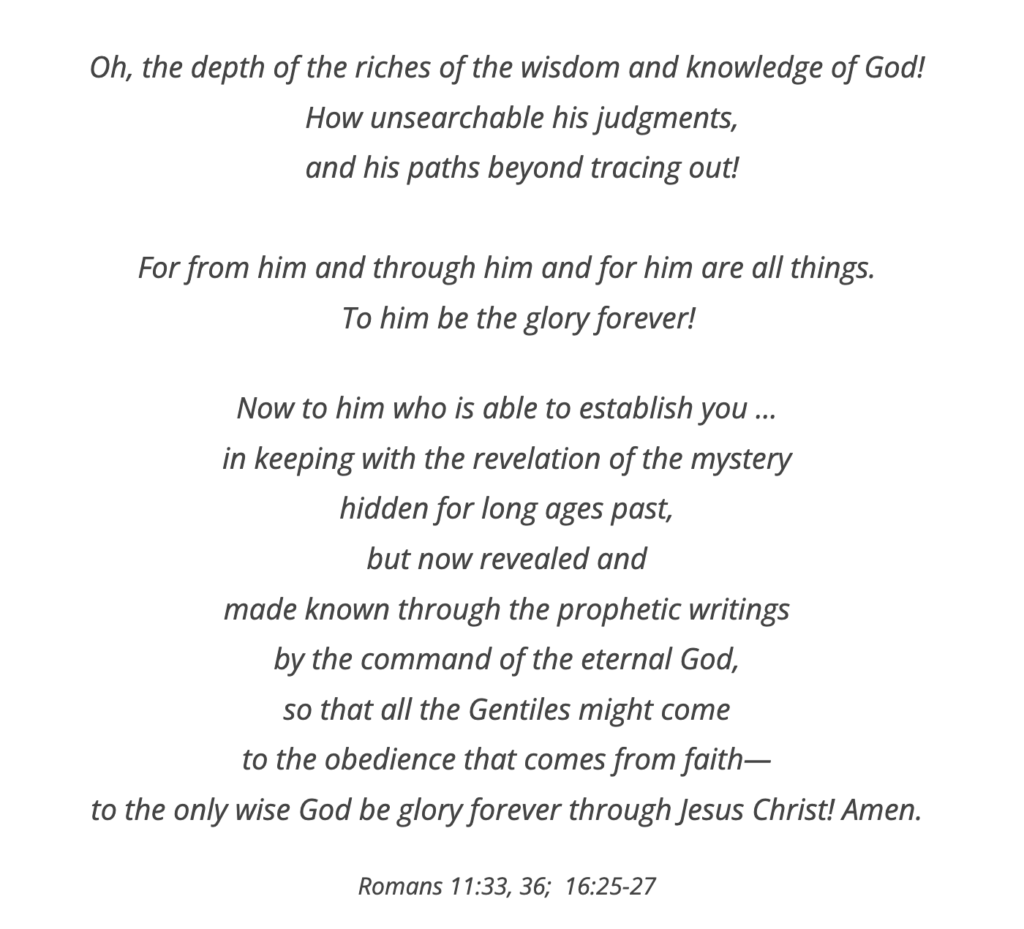Paul concludes his letter to the Roman church by highlighting coworkers and sending greetings. The list of people is long; many are not mentioned anywhere else in scripture. There are principles we can pull from this chapter.
Real People
Paul wrote this big theological letter to real people, ordinary people, people who may have been poor or slaves. Commentators suggest that Ampliatus, Urbanus, Stachys, Apelles, Asyncritus, Phlegon, Hermes, Patrobas, Hermas, and others were slaves or people who had been freed from slavery. The profound truths of God are for all people, not just the theological scholars or spiritually adept.
Your instructions are a doorway through which light shines.
Psalm 119:130 NET
They give insight to the untrained.
Psalm 119:130 reminds us that the Word gives light and lets in light. Notice that the Word begins in Genesis with, “Let there be light!” And in Revelation 22:5, “There will be no more night … for the Lord God will give them light.” Paul writes to the Ephesian church, “Live as children of light, for the fruit of the light consists in all goodness, righteousness, and truth.” This light, our relationship with God, gives insight even to the simple-minded, the poor, and the slaves.
Real Diversity
Paul greets men, women, Jews, Gentiles, slaves, and heads of households. Paul had a myriad of friends and acquaintances at all levels of society. He did not show favoritism in his greetings. And clearly, he knew these people well enough to commend their diligence in the faith. Note how he often says that his friends labored or worked hard, implying both physical labor and the “toilsome efforts of teachers in proclaiming and promoting the kingdom of God and Christ” (biblehub.com/greek/2872).
We might look at Paul’s list of greetings and think about our church. Young and old, new to life in Christ and veterans in the faith, men and women working together in Godly friendships, shouldering burdens together, and ministering in our communities so that the world will see our good works and glorify our Father in Heaven.
Ministering Women
There is a debate among scholars about women’s roles in the church. This is a passage that scholars often point to in relating how women might have served the church.
Phoebe
Most scholars agree that Phoebe was an influential woman in her church who traveled to Rome, delivered the letter, and as Paul’s representative, would have answered questions about the contents. Her understanding of Paul’s theology had to be well-grounded and deep.
Paul calls Phoebe a deacon (diakonos) which means she regularly helped others. Whether she held a specific position in her church is not clear. He also says that Phoebe was a benefactor (prostatis), using her influence and resources to advocate for others.
Priscilla
When you introduce your married friends, whose name do you say first? Just curious. Sometimes, I always say the husband’s name first, but in some instances, I say the wife’s name first. Interestingly, when Luke and Paul refer to Priscilla and her husband, Aquila, her name is listed first five out of six times (Acts 18:18, Acts 18:19, Acts 18:26, Romans 16:3, 2 Timothy 4:19) which lends emphasis to her role in God’s work. We know Priscilla and Aquila were tentmakers who welcomed Paul into their home and business while he established the church at Corinth. They also mentored Apollos in theology so that he could preach with authority and clarity. Paul refers to both Priscilla and her husband as coworkers in the faith. The atypical references to Priscilla indicate that she was noted for her faithful service to Christ in leadership roles.
Junia
Andronicus and Junia may have been married, or possibly brother and sister. Paul tells us that they were his kin (by birth? in the family of God?), imprisoned with him for some time, Christians before he was, and well-known to the apostles. Some interpret Romans 16:7, as saying that Junia was an apostle. If so, the meaning there is not the same as the twelve Apostles, or with the same calling as Paul, but more likely meaning that she was involved in Jesus’ ministry before His death or was sent out as a missionary. Clearly, Junia was a hard worker and was noted for her faith.
In the Lord
Paul highlights real people in his greetings, diverse, and yet, they were united “in the Lord.” That was the common element that connected these folks in Paul’s mind. “In Christ” is significant in Paul’s letter to the Romans because he writes to the church about the necessity of unity. He points out the universality of sin, that there is none righteous, no not one. He points to faith in Christ as the sole source of our salvation. Paul illustrates that while God chose the nation of Israel as His people, He always had in mind that He would draw all nations to Himself. Our position in Christ unifies us in our diversity. It is also the motivation for our service to God – which is Paul’s point in his long list of greetings.
Benediction

I invite you to subscribe by email if you read my posts regularly. To subscribe, simply add your email address in the box below. You’ll receive a message to confirm your email. Then, when I publish a post, it will be right in your inbox!
By the way, I am not selling anything; there are no tricks, spam, or optional offers. Adding your email simply means you won’t miss a blog post; you can unsubscribe anytime!
